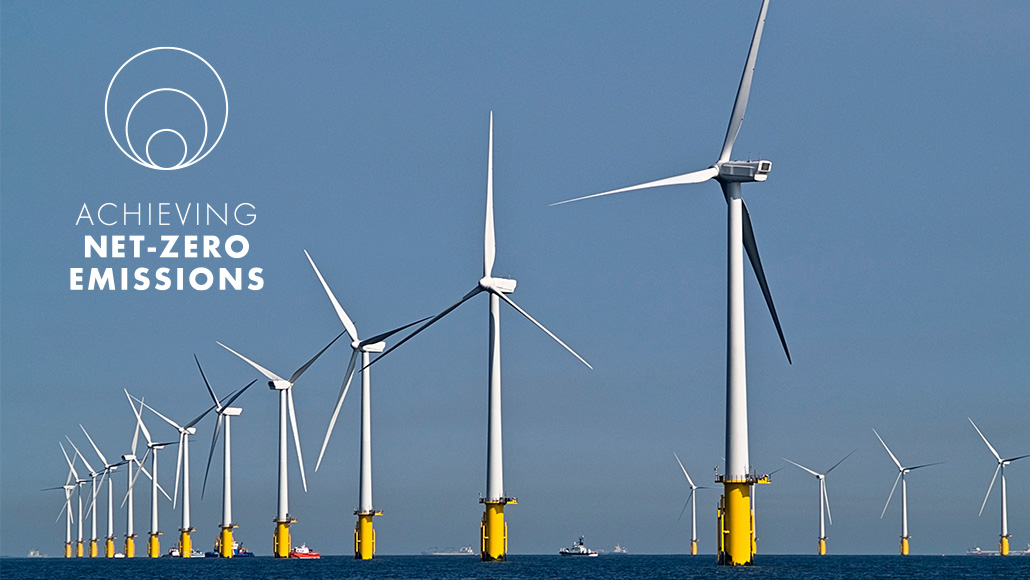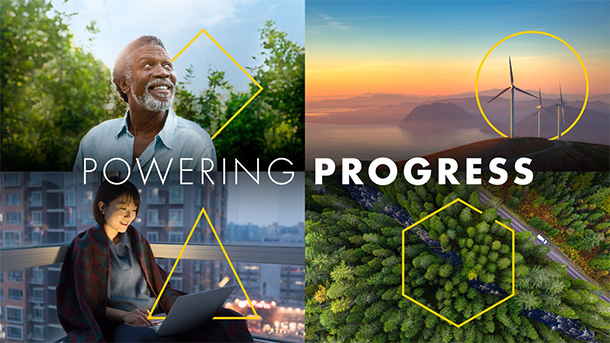Our strategy
Powering Progress is our strategy to generate value for shareholders and become a net-zero emissions business by 2050. It is designed to help customers decarbonise and bring benefits for wider society, while respecting nature. Our strategy is underpinned by our focus on safety, and our core values of honesty, integrity and respect for people.
Context
Climate change is one of the biggest challenges the world faces today. In 2022, geopolitical events showed that a secure supply of energy is crucial, and a growing global population is likely to continue to drive demand for energy, including oil and gas, for years to come. This necessitates society’s rapid transition to a low-carbon, multi-source energy system.
Shell supports the most ambitious goal of the Paris Agreement, which is to limit the rise in global average temperature this century to 1.5 degrees Celsius above pre-industrial levels. To achieve this, urgent action is needed to reduce emissions across power, transport, buildings, and hard-to-abate industries, such as steel and concrete. Around 140 countries and more than 2,000 companies and organisations have made commitments to get to net-zero emissions by 2050.
Shell seeks to play its part, purposefully and profitably, in the energy transition, while helping to maintain energy security. We are building a resilient business by putting customers at the centre of our strategy, and innovating the products and solutions they need. Our integrated assets and supply chains are designed to deliver value for our shareholders and customers. We aim to manage risk for Shell and our customers as we produce, buy, trade, transport and sell energy products and solutions worldwide.
The energy transition brings risks, involves confronting complex obstacles, and poses great challenges. The energy transition also offers significant opportunities.
We seek to work with our customers to identify available, affordable and low- and zero-carbon energy solutions that meet their changing needs and to help decarbonise the energy system.
There will be no single solution that fits all customers. Instead, there will be variations with differing approaches and rates of progress across countries, sectors and markets.
Customers’ use of the energy we sell generates most emissions. Helping our customers get to net zero will also reduce our net carbon intensity, and the average amount of greenhouse gas emissions we produce for every unit of energy that we sell and that is used by our customers.
We work with sectors that would benefit from the expertise and experience that energy companies can provide to help them find a path to net-zero emissions. Aviation is one of these sectors. Together with our customers, we are working on changing energy demand and developing ways to help increase the use of low-carbon fuels and decrease carbon emissions from this sector. Meanwhile, on the supply side, in Rotterdam in the Netherlands, Shell is building an 820,000-tonnes-a-year biofuels facility. This is expected to be among the largest in Europe, producing sustainable aviation fuel and renewable diesel made from waste and certified sustainable vegetable oils.
Powering Progress
Our Powering Progress strategy comprises: generating shareholder value, achieving net-zero emissions, powering lives and respecting nature. It is a strategy that integrates sustainability with our pursuit of value through high performance. Our purpose is to power progress together by providing more and cleaner energy solutions. We also expect our employees and contractors to maintain Shell’s focus on safety and abide by our core values of honesty, integrity and respect for people.
Powering Progress is a strategy that combines our financial strength and discipline with a dynamic approach to our portfolio of assets and products, so we can seize the opportunities of the energy transition. Shell transforms its portfolio continuously to better meet the clean energy needs of its customers today and in the future.
Achieving our strategy depends on how we respond to competitive forces. We assess the external environment – the markets and margins, and the underlying economic, political, social and environmental drivers that shape them – to evaluate commercial opportunities and potential new business models. We regularly review the markets where we operate, and assess our competitive position by analysing trends, uncertainties, and the strengths and weaknesses of our traditional and non-traditional competitors.
We maintain business plans that focus on actions and capabilities to create and sustain competitive advantage. We maintain a risk management framework that regularly assesses our response to, and appetite for, identified risks.
Our Executive Directors’ remuneration is linked to the successful delivery of our strategy, based on performance indicators that we consider to be aligned with shareholder interests. Long-term incentives form the majority of the Executive Directors’ remuneration for above-target performance. In 2022, the Long-term Incentive Plan (LTIP) included conditions relating to cash generation, capital discipline, value created for shareholders, and energy transition.
Generating shareholder value
Powering Progress is designed to pursue shareholder value, make disciplined and focused investments to grow our businesses, and help Shell become even more competitive and resilient.
We aim to create the conditions for share price appreciation by optimising the performance of our businesses. We are also preparing for the future by seizing the opportunities presented by the energy transition. Shell takes a dynamic approach to its portfolio by continuing to provide the energy the world needs and increasing our investments in low- and zero-carbon energy products and services.
We aim to generate value for shareholders by providing sustainable distributions through our progressive dividend policy and share buyback programmes. In 2022, we generated $68.4 billion cash flow from operating activities. Our cash capital expenditure was $24.8 billion and total shareholder distributions amounted to $25.8 billion, whilst we reduced our net debt to $44.8 billion as at December 31, 2022.
We completed our share buyback programmes in 2022 with a combined value of $18.4 billion. We increased our dividend to $0.25 per share in the first quarter of 2022 and announced a 15% increase for the fourth quarter of 2022. Total shareholder distributions were in excess of 35% of cash flow from operating activities.
We seek to maintain a strong balance sheet and apply a disciplined approach to capital investment. In this way, we believe we will achieve our aim of building a compelling investment case for our shareholders.

Achieving net-zero emissions
We have a long-term target to become a net-zero emissions energy business by 2050.
The target covers emissions from our operations (Scope 1), emissions from the energy we buy to run our operations (Scope 2), and emissions from our customers’ use of the energy products we sell (Scope 3).
We also have targets to reduce the net carbon intensity of the energy products we sell, with 2016 as our baseline year. These include targets of a 6-8% reduction by the end of 2023, a 9-12% reduction by the end of 2024, and a 9-13% reduction by the end of 2025. Our medium- and longer-term targets are to reduce by 20% by 2030, by 45% by 2035 and 100% by 2050. We achieved our target of a 3-4% reduction by the end of 2022. We also have an absolute emissions reduction target of 50% on all Scope 1 and 2 emissions under Shell’s operational control by 2030 on a net basis. By the end of 2022, Shell had reduced its absolute Scope 1 and 2 emissions by 30%.
We place a high priority on combating methane emissions linked to oil and gas, and we have set a target to keep our methane emissions intensity for operated oil and gas assets (including liquefied natural gas) below 0.2% by 2025. In 2022, methane emissions intensity for operated facilities with marketing gas was 0.05%.
We are transforming our business and selling more low-carbon products and services, such as electricity generated by solar and wind power, hydrogen, biofuels, and charging for electric vehicles. We are helping sectors to decarbonise by working collaboratively with customers, businesses and governments.
Shell engages with governments and other stakeholders, such as international organisations and industry associations, to support robust policies, legislation and regulations designed to accelerate the transition to net-zero emissions.

Powering lives
Shell is dedicated to making a positive impact on the lives of people around the world. We work to improve people’s lives through our products and activities, and by contributing to local communities and championing inclusion.
We help to power lives and livelihoods by providing vital energy for homes, businesses and transport. Millions of people live without access to affordable, reliable and sustainable energy, and this has been exacerbated by the geopolitical events of 2022. Energy supply is crucial for addressing global challenges, including those related to poverty and inequality. In line with our Powering Progress strategy, Shell has been striving to bring reliable electricity to those in emerging markets who do not yet have it.
We support livelihoods by providing employment and training in the communities where we operate. In addition, we buy and sell goods and services and generate revenues for governments through the taxes and royalties we pay and the sales taxes we collect on their behalf. This helps governments fund health care, education, transport and other essential services.
Shell is working to become one of the most diverse and inclusive organisations in the world, a place where everyone feels valued and respected. We are focusing on four areas: gender; race and ethnicity; lesbian, gay, bisexual and transgender (LGBT+); and disability.
We seek to respect human rights in all parts of our business. In 2021, Shell published a commitment to worker welfare as part of our approach to human rights and implemented the new Worker Welfare Control Framework requirements based on principles developed by the global, business-led coalition Building Responsibly. These requirements became mandatory in 2022 for Shell and our contractors.

Respecting nature
Our environmental ambitions include protecting and enhancing biodiversity. We are also focused on using water and other resources more efficiently and reusing as much of them as we can. We are reducing waste from our operations and increasing the recycling of plastics.
We are committed to recycling plastic waste in our chemical facilities. Shell’s proprietary technology to improve the quality of pyrolysis oil is a key process in delivering on this ambition. Pyrolysis is a technique whereby hard-to-recycle plastics are broken down into raw materials. We have invested in our first pyrolysis oil upgrader unit at the Shell Energy and Chemicals Park Singapore. In Canada, Shell has been working with the people of Dawson Creek city to manage water use at our nearby natural gas operations at Groundbirch. We worked with the city council to open a plant that treats municipal waste water that would otherwise be discharged to a local river. Our Groundbirch site recycles around 98% of water used for its operations.
Across Shell, we are helping to improve air quality by reducing emissions from our operations and providing clean ways to power transport and industry.
Our purchasing policies include requirements that reflect our environmental framework and take the energy efficiency, material efficiency and sustainability of products into consideration in our purchases.











